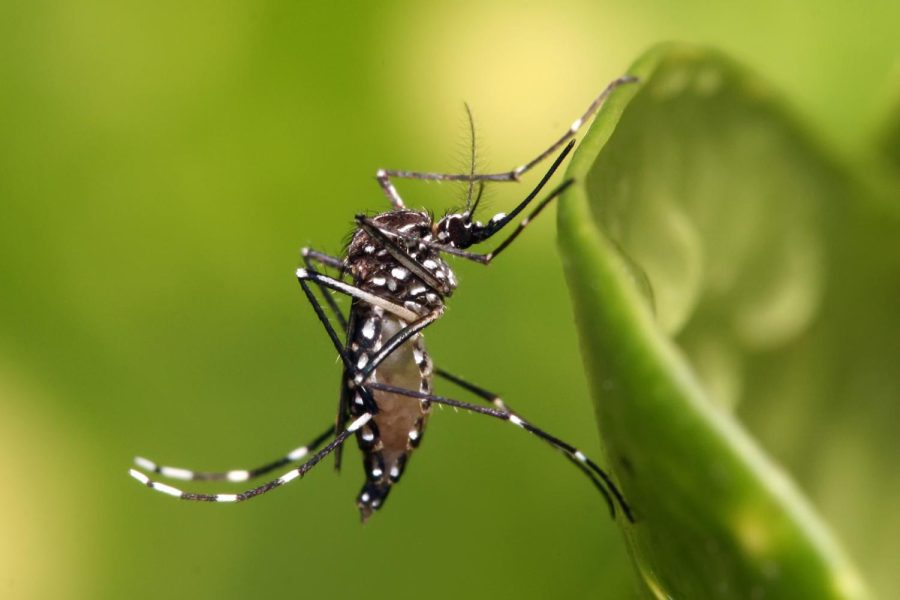First Ohio case of Zika virus reported in Cleveland
Aedes aegypti mosquito, which can carry the Zika virus. By Muhammad Mahdi Karim (www.micro2macro.net) Facebook Youtube – Own work, GFDL 1.2, https://commons.wikimedia.org/w/index.php?curid=9556152
Ohio reported its first case of the Zika virus Tuesday, a mosquito-borne virus that originated in the Western Hemisphere in Brazil and traveled through Central America to the United States.
An infected woman returned to Cleveland after traveling in Haiti. Jennifer Hanrahan, chair of MetroHealth’s Infectious Disease Control Committee, said in a press conference Tuesday there should be no concern about an outbreak.
Tara Smith, a Kent State associate professor of epidemiology and biostatistics, said about 80 percent of people infected with the Zika virus do not show symptoms.
For the other 20 percent, potential symptoms include rash, headaches, fever, muscle aches and joint pains. There is also a potential correlation between Zika and a birth defect known as microcephaly, causing infants to be born with smaller heads, which could affect their brain development.
Although there have been 4,000 cases of microcephaly since late 2015 and early 2016, it is not proven Zika caused all of these cases of microcephaly, Smith said.
“A few of the mothers and babies did have some evidence of the Zika virus infection, but we still can’t be 100 percent sure that Zika virus is causing (microcephaly),” Smith said.
The Zika virus might also cause another rare neurological disorder called Guillain-Barre, which causes the body’s immune system to attack the nerves, said Thomas M. File Jr., chairman of the Infectious Disease Division at Akron’s Summa Health System.
The disorder can cause paralysis in the lower extremities. However, File said this paralysis is usually reversible and goes away.
“In general, this (Zika virus) does not cause severe disease that requires hospitalization,” File said. “This is not like a patient who develops Ebola and is severely ill.”
Although the virus is typically transmitted through mosquito bites, there is a possibility the virus could be transmitted sexually, such as in Texas on Feb. 2.
File said the medical community is concerned with how quickly the virus is spreading.
“It’s not as if the Zika virus is totally new to the world. It’s been around for decades in other parts of the world. It’s just now we’re starting to see it in the Western Hemisphere and close to North America,” File said. “I think it illustrates that we’re always going to be at risk from these ‘emerging infections’ that are in other parts of the world.”
Smith said Aedes aegypti, the mosquito species that transmits the Zika virus, is in the southern parts of the United States. Although Smith said Americans can avoid the Zika virus by using mosquito repellent and wearing long-sleeved shirts, she said there is no reason to panic.
“For kind of young, healthy people in general, odds are pretty good that even if you catch (Zika), it’s going to be a mild disease,” Smith said. “For people that are staying here and do not have any travel issues, it is really not going to affect you.”
Brazil’s President Dilma Rousseff is attempting to curb the virus’ spread by deploying 220,000 troops across Brazil’s most vulnerable areas to destroy mosquito nests and pass out informational pamphlets to the public.
“The government has been doing a lot of projects to try to instruct the population and society to give them a little better understanding of why the virus is spreading and what we can do,” said Bruno Beidacki, a sophomore journalism major and native of Porto Alegre, Brazil. “The media is also playing a huge role in the dissemination of information because not everyone has access to government officials.”
Brazilian students at Kent State said Brazil is no stranger to diseases such as the Zika virus.
“Brazilians are just so used to having to watch out for a bunch of different mosquitoes and tropical diseases that the Zika virus is just another one of those,” said Leticia Andretta, a freshman journalism major and native of Curitiba, Brazil.
Andretta said she has also heard about pregnant women in her home country fearing birth defects.
“I just read an article on a Brazilian newspaper about how Brazilian women diagnosed with the Zika virus have abortions even before microcephaly is confirmed,” Andretta said. “That raises a lot of concern and tension in Brazil because abortion is not even legalized there yet.”
The CDC issued a warning urging people, especially pregnant women, to avoid traveling to infected countries, including Brazil.
It also asked women who are trying to get pregnant and plan on traveling to consult with a doctor first.
The CDC elevated its Emergency Operations Center activation level on Feb. 8 to level one, which is its highest level.



